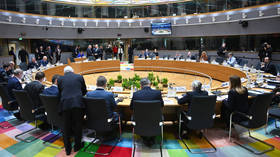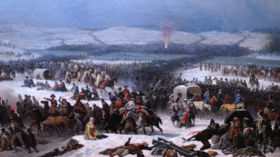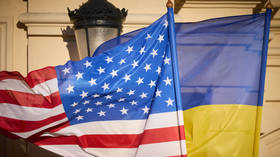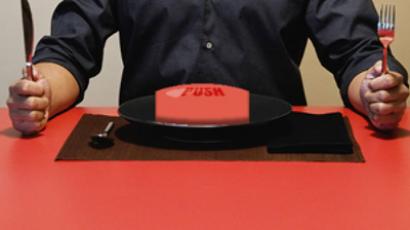ROAR: United Russia “determined itself as a right-wing party”

During its congress in St Petersburg, the ruling United Russia party has decided to follow the two main directions, “Russian conservatism” and “modernization” and stressed they are compatible, the media say.
United Russia “has declared itself a party of Russian social conservatism,” Vremya Novostey daily said. But the party did not adopt the ultimate version of its program, the paper said, assuming that it has decided “to wait and see who will become the president in 2012.” This time, the party limited itself to “the program document,” the paper said.
The document mentions the need to modernize the country, and Boris Gryzlov, speaker of the State Duma and chairman of the United Russia’s supreme council, said the party’s conservatism is able to secure the modernization, the task set by President Dmitry Medvedev.
Both the president and the party’s chairman, Prime Minister Vladimir Putin, addressed the congress. Putin’s speech demonstrated the like-mindedness of the prime minister and the president, said Olga Kryshtanovskaya, head of the sector of Studies of Elites at the Institute of Sociology.
Putin supported the president’s address to the parliament, she told the party’s official website Er.ru, commenting on the results of the congress. The prime minister also stressed that he shared Medvedev’s views on modernization, the analyst noted.
Dmitry Orlov, general director of the Agency of Political and Economic Communications, said that Putin had demonstrated “the understanding of the existing threats and the readiness of the party for transformations and the innovation process.” His call to “conduct the revision of bureaucracy is a call that can change the situation,” Orlov told Nezavisimaya Gazeta daily.
The president and the premier are demonstrating unanimity, “first of all, in solving the economic problems that Russia is facing,” he said. The daily added that both Medvedev and Putin “demanded that the party be modernized.”
“The tandem has coordinated the strategy and tactics of modernization,” Pavel Salin of the Center for Political Conjuncture said. The prime minister’s speech, on the one hand, was a program one, but on the other it represented a detailed elaboration of the president’s address to the parliament, the analyst said.
“Prior to the congress, information attacks were launched, the aim of which was to show that United Russia did not wish to build into the modernization agenda and wanted to ‘freeze’ the president’s initiatives by choosing the ideology of Russian conservatism,” Salin said.
However, the results of the congress have confirmed other predictions – “that the premier’s speech would expand and deepen the president’s address and propose concrete measures for the realization of its goals,” he added.
Having called themselves “conservatives,” the members of United Russia “have simply determined their place” as a right-wing party, political scientist Dmitry Travin said. That means that they are “politicians who defend values of the market economy based on national traditions,” Rosbalt news agency quoted him as saying.
At the same time, they “are not staunch defenders of freedom as liberals,” and they are not “followers of egalitarianism as social democrats,” he said. Travin also believes that members of United Russia understand the term “modernization” too narrowly, only as a technological one. “They say it is necessary to introduce more high technology and everything will be all right,” he noted. “But it is a very simplistic idea.”
However, no matter how United Russia has determined itself, it will work on the political field with few real competitors. TV anchor Maksim Shevchenko believes that United Russia has no serious rivals. He told Er.ru that “the Communist Party is becoming increasingly marginal,” despite the fact that that it has strong politicians.
The country lacks “a serious left constructive force,” Shevchenko said. The present opposition cannot play a serious part as a rival to United Russia, the party “which has accumulated huge human and intellectual resources,” he said. And this is a problem for United Russia itself, he said.
The party, however, estimates its competitors. Andrey Isaev, first deputy secretary of United Russia’s presidium of the general council, said at the Mediaforum, an event organized prior to the party’s congress: “When opponents from the left fight for interests of one class, the class of workers, opponents from the right fight for the success of an individual, [United Russia] fight for the success of the Russian people as a whole.”
Isaev was quoted by Rosbalt as saying that only ten years ago there was nothing “to conserve.” Now people have changed their attitude to the term “conservatism,” he said.
Boris Gryzlov, speaker of the State Duma and chairman of United Russia’s supreme council, said at the congress that the Communists cannot propose anything but a slogan “to take away and divide” and the Liberal Democratic Party “is loudly sounding with emptiness.”
Director of the Center for Political Conjuncture, Aleksey Chesnakov, said at the Mediaforum that conservatism opposes radicalism. He believes that only a conservative party is able to conduct the modernization, as it has been in many countries.
The Russian president proposes modernization not only in the technological sphere. Medvedev told the participants of the congress that he expected the party to support his proposals for political reforms “on a regional level.”
In this regard, Vedomosti said that three principle novelties have been added to the party’s chapter: compulsory participation of the party’s members in debates during elections at all levels, nomination of candidates based on primaries and the norm that allows regional political councils to withdraw heads of municipal organs or regions.
If a party wants to go into the future, “it has to change,” believes Valery Fedorov, director of the public opinion research center VTsIOM. Even if “the economic crisis seems to be ending, the political system has endured the test, and the United Russia as a central element of this system has also passed it,” he wrote on Actualcomment.ru website.
Stability is very important, but there is also a task of the modernization, and for this the party should change too, Fedorov said. The party’s leadership stressed that conservatism is not an antithesis to modernization, the analyst added. “It is important because there will be a paradox: the ruling party is conservative, and the president is urging [the country] to modernize,” he said.
“Boris Gryzlov has proposed a decision –modernization based on national values of Russians,” Fedorov said. “And this is just the essence of Russian conservatism; we have our own national values – family, freedom, property, order, respect for history, and sovereignty.”
“These values are not going anywhere, they are not being removed from the agenda,” the analyst said. “The party confirmed its adherence to them on the ideological level. And on the practical level the modernization of the country is becoming the main slogan.”
Sergey Borisov, RT














